Related Research Articles

San Francisco is a 1936 musical-drama disaster film directed by W. S. Van Dyke, based on the April 18, 1906 San Francisco earthquake. The film stars Clark Gable, Jeanette MacDonald and Spencer Tracy. MacDonald's singing helped make this film a major hit, coming on the heels of her other 1936 blockbuster, Rose Marie.
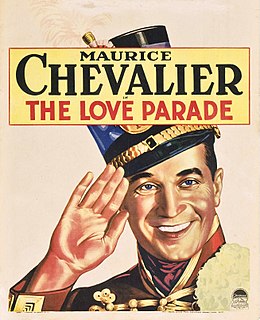
The Love Parade is a 1929 American pre-Code musical comedy film, directed by Ernst Lubitsch and starring Maurice Chevalier and Jeanette MacDonald, involving the marital difficulties of Queen Louise of Sylvania (MacDonald) and her consort, Count Alfred Renard (Chevalier). Despite his love for Louise and his promise to be an obedient husband, Count Alfred finds his role as a figurehead unbearable. The supporting cast features Lupino Lane, Lillian Roth and Eugene Pallette.

The 1989 Loma Prieta earthquake occurred on California's Central Coast on October 17 at 5:04 p.m. local time. The shock was centered in The Forest of Nisene Marks State Park in Santa Cruz County, approximately 10 mi (16 km) northeast of Santa Cruz on a section of the San Andreas Fault System and was named for the nearby Loma Prieta Peak in the Santa Cruz Mountains. With an Mw magnitude of 6.9 and a maximum Modified Mercalli intensity of IX (Violent), the shock was responsible for 63 deaths and 3,757 injuries. The Loma Prieta segment of the San Andreas Fault System had been relatively inactive since the 1906 San Francisco earthquake until two moderate foreshocks occurred in June 1988 and again in August 1989.

Jeanette Anna MacDonald was an American singer and actress best remembered for her musical films of the 1930s with Maurice Chevalier and Nelson Eddy. During the 1930s and 1940s she starred in 29 feature films, four nominated for Best Picture Oscars, and recorded extensively, earning three gold records. She later appeared in opera, concerts, radio, and television. MacDonald was one of the most influential sopranos of the 20th century, introducing opera to film-going audiences and inspiring a generation of singers.
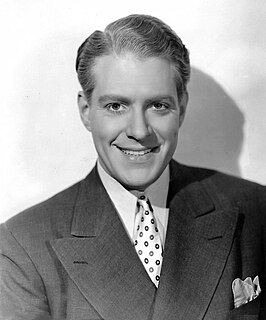
Nelson Ackerman Eddy was an American actor and baritone singer who appeared in 19 musical films during the 1930s and 1940s, as well as in opera and on the concert stage, radio, television, and in nightclubs. A classically trained baritone, he is best remembered for the eight films in which he costarred with soprano Jeanette MacDonald. He was one of the first "crossover" stars, a superstar appealing both to shrieking bobby soxers and opera purists, and in his heyday, he was the highest paid singer in the world.

I Married An Angel is a 1938 musical comedy by Rodgers and Hart. It was adapted from a play by Hungarian playwright János Vaszary, entitled Angyalt Vettem Felesegul. The book was by Richard Rodgers and Lorenz Hart, with music by Rodgers and lyrics by Hart. The story concerns a wealthy banker who, disillusioned with women, decides that the only mate for him would be an angel. An angel soon arrives, and he marries her, but finds out that her perfection and guilelessness are inconvenient.

"I Left My Heart in San Francisco" is a popular song, written in the fall of 1953 in Brooklyn, New York, with music by George Cory (1920–1978) and lyrics by Douglass Cross and best known as the signature song of Tony Bennett.
"The Man that Got Away" is a torch song, published in 1953 and written for the 1954 version of the film A Star Is Born. The music was written by Harold Arlen, and the lyrics by Ira Gershwin. In 1955, it was nominated for the Academy Award for Best Original Song. In 2004, Judy Garland's performance of the song was selected by the American Film Institute as the eleventh greatest song in American cinema history.
"You'll Never Know", sometimes referred to as "You'll Never Know " in later years, is a popular song with music written by Harry Warren and the lyrics by Mack Gordon. The song is based on a poem written by a young Oklahoma war bride named Dorothy Fern Norris.

"If You Were the Only Girl " is a popular song, written by Nat D. Ayer with lyrics by Clifford Grey. It was written for the musical revue The Bing Boys Are Here, which premièred on 19 April 1916 at the Alhambra Theatre in Leicester Square, London. The song was originally performed as a duet between Lucius Bing, played by George Robey, and his love interest Emma, originated by Violet Loraine.

Maytime is a 1937 American musical romantic drama film produced by MGM. It was directed by Robert Z. Leonard, and stars Jeanette MacDonald and Nelson Eddy. The screenplay was rewritten from the book for Sigmund Romberg's 1917 operetta Maytime by Rida Johnson Young, Romberg's librettist; however, only one musical number by Romberg was retained.
"What'll I Do" is a song written by Irving Berlin in 1923. It was introduced by singers Grace Moore and John Steel late in the run of Berlin's third Music Box Revue and was also included in the following year's edition.
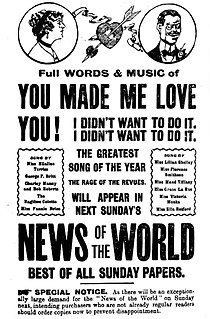
"You Made Me Love You " is a popular song from 1913 composed by James V. Monaco with lyrics by Joseph McCarthy. It was introduced by Al Jolson in the Broadway revue The Honeymoon Express (1913), and used in the 1973 revival of the musical Irene.
Nancy LaMott was an American singer, popular on the New York City cabaret circuit in the 1980s and breaking out into radio and the national and international scene in the 1990s. Along with Karen Mason, she was the first singer to do a continuous long run at Don't Tell Mama in New York City. She went on to play all of the smaller clubs in New York, and began to record in the early 1990s.
"Climb Ev'ry Mountain" is a show tune from the 1959 Rodgers and Hammerstein musical The Sound of Music. It is sung at the close of the first act by the Mother Abbess. It is themed as an inspirational piece, to encourage people to take every step toward attaining their dreams.
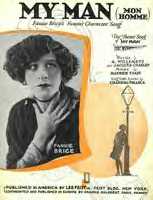
"Mon Homme" ,also known by its English translation, "My Man", is a popular song first published in 1920. The song was originally composed by Maurice Yvain with French lyrics by Jacques-Charles and Albert Willemetz. The English lyrics were written by Channing Pollock.

"There's a Long, Long Trail" is a popular song of World War I. The lyrics were by Stoddard King (1889–1933) and the music by Alonzo "Zo" Elliott, both seniors at Yale. It was published in London in 1914, but a December, 1913 copyright for the music is claimed by Zo Elliott.

The Firefly is a 1937 musical film starring Jeanette MacDonald and Allan Jones. The film is an adaptation of the operetta of the same name by composer Rudolf Friml and librettist Otto A. Harbach that premiered on Broadway in 1912. The film used nearly all of the music from the operetta but jettisoned the plot in favor of a new storyline set in Spain during the time of the Emperor Napoleon I. It added a new song, "The Donkey Serenade", which became extremely popular, as was one of the Friml songs, "Giannina Mia". The original release prints of the film were elaborately tinted with Sepia-Blue, Sepia-Orange and Sepia-Blue-Pink.
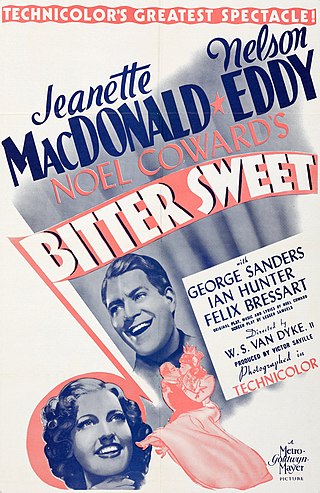
Bitter Sweet is a 1940 American Technicolor musical film directed by W. S. Van Dyke, based on the operetta Bitter Sweet by Noël Coward. It was nominated for two Academy Awards, one for Best Cinematography and the other for Best Art Direction by Cedric Gibbons and John S. Detlie.

American actress/singer Jeanette MacDonald recorded over 50 songs during her film career for RCA Victor and its foreign counterparts. Due to the limited statistics released to the public, it is not certain how many songs and singles she has released or their exact popularity in music charts, although she has officially recorded eight studio albums and released seven compilation albums. Despite soundtracks for musical films not becoming a concept until the 1940s, many of her singles were re-recordings of songs she had performed in the movies ; her first "album" was the single "Dream Lover"/"March of the Grenadiers" (1930) on 78 rpm discs for The Love Parade. She also recorded a cover album of songs featured in Sigmund Romberg's Up in Central Park in 1945 with Robert Merrill, as well as non-English records during her 1931 European tour.
References
- ↑ sfmuseum.org
- ↑ Turk, Edward Baron (1998). Hollywood Diva: A Biography of Jeanette MacDonald . University of California Press. pp. 185.
- ↑ Archived at Ghostarchive and the Wayback Machine : "Fans sing "San Francisco" at 1989 World Series". YouTube .